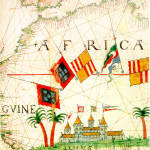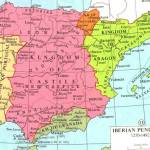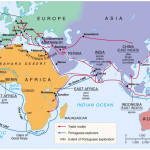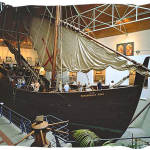
Reprising these reflections from reading Eric Axelson’s Congo to Cape: Early Portuguese Explorers. Always an interesting question to ask how great ventures begin: Why did they start when and where they did? Why were they initiated by those individuals or groups and not others?
The circumnavigation of Africa was a great achievement over many decades. In principle many people — European, African, or Asian — could have accomplished it. So why the Portuguese?
Axelson’s explanation:

“It was no accident that Portugal became the first European country in modern times to explore and colonize beyond the seas. Her medieval wars of independence against Leon and Castile, and her campaigns against the Moors in the Iberian peninsula, had encouraged the growth of a national spirit by the time — in the middle of the twelfth century — Portugal attained what are essentially her present frontiers. Bounded by unfriendly and often actively hostile Spanish kingdoms and Muslim principalities, Portugal was forced to look to the sea not merely for communication with the rest of Christendom, but also for essential trade: the export of salt and oil, of wine and cork, and the import of most of the manufactured goods her people needed. Moreover, her pastures and her cultivated lands were infertile, and the sea provided necessary food. Her fishermen became consummate seamen, and out of their ranks emerged the crews of ships that sailed in the Middle Ages to the farthest parts of northwestern Europe and of the Mediterranean” (p. 19).

My thoughts: Axelson’s explanation is a good start but more is necessary. Many medieval peoples fought wars to protect their independence, and many places with poor soil became good at fishing; yet very few generated great exploration cultures. Axelson’s middle point about trade is strong: the map at right (click to enlarge) shows that Portugal is at the fringes when it comes to trade with just about everyone and that the land trade routes were already controlled by others (e.g., the Venetians and Levantines). But it’s still a question in my mind why the Portuguese didn’t simply acquiesce to an isolated, marginal existence; after all, that’s what many peoples throughout history have done. So who were the key deciders who initiated and led and pushed the Portuguese into great activity and accomplishment?
Another question: Axelrod gives one political and two economic motivations — were other factors such as scientific curiosity or religious evangelism significantly operative?

Here’s a list, adapted from this site, of key Portuguese names and dates:
1394: Henry the Navigator born
1419: Madeira Islands discovered by explorers Zarco and Tristao Vaz Teixeira
1427: Azores Islands discovered by Diogo Silves
1434: Exploration of the African coast begins
1444: Discovery of the Cape Verde islands
1484: Diogo Cao discovers the River Congo
1487: Bartholomeu Dias leads an expedition around the Cape of Good Hope
[1492: Christopher Columbus discovers the New World]
1498: Vasco da Gama reaches India via navigation around Africa
1500: Pedro Alvares Cabral discovers Brazil
1519: Ferdinand Magellan leads the first voyage around the World
1542: Portuguese explorers are the first Europeans to land in Japan
1569: Nagasaki, Japan is opened to Portuguese traders
I’m reading a book (The Scents of Eden: A Narrative of the Spice Trade, by Charles Corn) about the spice trade back in the sixteenth and seventeenth centuries, and Portugal was the first Western country on the scene. Spices were the luxury good of those days, and a fortune was waiting for whatever Western country could buy them at the source for peanuts, then sell them for a King’s ransom back home. Magellan was one of the first explorers to reach the spice islands, along with other Portuguese. So the lure of huge profits was certainly one of the motivating factors of Portuguese maritime explorations.
Outflanking Islam (in both trade and evangelisation) was definitely a motive. Prince Henry was a crusader (as was Isabella of Castile: it was a motive in her support of Columbus). The Iberian attempt to outflank Islam turned into the most successful strategic stroke in history, given it propelled Christianity into the dominant world religion and led to Islam’s comparative decline.
There was some scientific curiosity too.
Medieval rulers were usually very keen to increase their trade income. So the lure of the profits of the spice trade was powerful.
Sure- this can be a bit like Malcolm Gladwell ragging on creators as just being lucky: born at the right time, into the right family – as if it required little of the individual in question. The point is: why did the Portuguese react as they did? And not some other way? Why did they set out? If full of fear they would not have. If, like the Chinese for centuries, they became insular, they’d have stagnated. Why the urge to explore? That requires a restless soul, a curious mind, an adventurous spirit. There’s a more complete explanation lurking….
Nicely stated, Mark.
We all know that intellectually active and innovative cultures require property rights, contract law, and free trade. I think the issue is where do these exist to a greater degree at a given period of history. And how do these happen to be the places.
My observation is that these are places relatively free from oppressive empires and which must exist by trade. Money rules more than kings or religion.
Why did philosophy begin with the Ionians? A Greek coastal community clinging to the edge of Turkey and a bunch of islands. A society existing by trade; which requires a live-and-let-live attitude, being accommodating to diverse opinions and cultures . . . the customer is always right, even if he is a stupid heathen with strange practices . . . because competition is ever present between the islands and among the communities . . . and money is king. Making money, the commercial class, is respected.
Ideas, free thinking, freedom of action can flourish in such environments. Intellectual activity is respected over religious practices. Lands where living is relatively easy and powerful leaders develop, like Egypt, suffocate intellectual activity, stifle innovation, and control trade.
Portugal was a relatively isolated society in the 14th-16th centuries. Naturally isolated by mountains, and overland trade was dominated by somewhat hostile empires in Spain. Like the Greek peninsula, not suitable for large scale farming. Fishing culture developed seamanship. Ships made contact with a wide range of cultures and ideas, stimulating innovation and appreciation of a freer culture with respect for the individual. King Henry was trying to get rich. The Christian and Muslim rulers of Spain and elsewhere were trying to enforce religion as a means of maintaining their power. All relative, of course. (My casual reading and speculation, as I am not a great scholar.)
As medieval civilizations grew more sophisticated, the conditions of intellectual and trade freedoms could be established over larger territories. Thus, the development of the English empire. Also, an isolated trading nation dependent on the sea. As were the Dutch. Later, the American colonies. Venice in Renaissance Italy.
I meant to summarize. Factors which isolate a society from more powerful empires are needed. Relatively weak government in terms of regulatory authority; thus, respect for commercial enterprises. Widespread trade with other cultures is the essential element, raising questions of beliefs, stimulating thought, and promoting tolerance.
The easier question may be why do so many societies fail to produce the innovative and adventurous? It is natural to individuals in a free community exposed to outside influences. What is preventing them?
I think the pictures are okay
Some here have made some good points:
– to spread Christianity to the world – to evangelize
– control of the Spice trade made Portugal the richest, most powerful nation on earth (for 150 years)
– plus, trading posts / possessions to expand Portugal’s small size, and Portugal’s criminals were sent
to the colonies to clear out their jails and to also assist in populating the colonies i.e., Azores, Madeira, Brazil, Cape Verde Islands, Angola, Mozambique, Guinea Bissau, Sao Tome & Principe Islands, Goa (India), mainly, etc.
Spain could not overtake Portugal, except from 1580 – -1640 and that was only because the Portuguese throne was vacant, and so Phillip of Spain gladly usurped the throne. Any country 1/5 the size of Spain would have felt invincible in having succeeded in keeping the big, mean, menacing neighbour at bay. That gave Portugal the impetus to sail the seven seas so to speak. The rest is history. Brazil was the huge, beautiful, paradisiacal, super resource rich prize! Angola and Mozambique are the smaller Brazils of Africa.
And for their monumental efforts, Portuguese is officially spoken on 5 continents, by 270 million speakers, and….Portuguese is the 6th most spoken language in the world. Plus, Portuguese is either obligatory/or a voluntary subject in the schools of several South American, African, Asian, European, North American schools. And Portugal is a member of at least 6 important world organizations. Last but not least, Portugal heads the CPLP (Community of Portuguese Speaking Countries) which is similar to the British Commonwealth. There are 10 member Portuguese official speaking countries, and almost as many Associate Member countries, and…just as many other ‘officially interested’ nations in the world.
No wonder why everyone is in love with Portugal that they are moving there in droves, including Italians French, Germans, English, and Spaniards, who don’t give compliments easily, and so that speaks volumes!
Oh, I forgot to say that there are huge Portuguese immigrant communities all over the word including: France, Venezuela, South Africa, USA, Canada, Luxembourg, Japan (450,000 Portuguese speaking Japanese Brazilians), etc.
The Portuguese language has a brilliant future and so do all of the big Portuguese speaking countries i.e., Brazil (7th strongest economy in the world), Angola and Mozambique (economic engines of Africa), and Portugal has become the darling of Europe! Wait, East Timor is growing it’s numbers of Portuguese speakers lately, at 50% fluent speakers – it’s a co-official language there). Where the heck have the Portuguese not been??? I can’t think of any….maybe Turkmenistan 🙂
Speaking of economies, China (Portuguese is a co-official language in the gambling Mecca of Macau – better than Las Vegas!), Japan, India, USA, just to name a few, do an incredible amount of trade with ALL of the Portuguese speaking countries in the world. Oh, and did I mention that those four nations are learning Portuguese as a 2nd language in earnest? They really are.
The Dutch expansionists come from a continent of Christian violence, Martin Luther has unleashed the Protestant Reformation, which is fought with stakes, gags and torture by the Spanish kings, Charles V and later his son Philip II. The toughest rebellion against this arises in a misty corner of the Spanish empire, “The Netherlands” here the Princes of Orange will fight for 80 years against Spanish rule, taxes and religious Inquisition.
And in that rebellious region, a miracle arises that will never be equaled again, The Spanish inquisition will cause the largest brain drain in European history. With Amsterdam as a gathering point for runaway Jewish bankers, Portuguese and Spanish merchants and an army of European paupers, the Dutch become Super wealthy.
During this 80 years with Spain, the Dutch will expand to the West with aggressive trade, because here is a large area that belongs to Spain, and everything that detracts from Spanish power is welcome, but the battle is always combined with trade, Dutch trading posts appear everywhere, the Dutch captains carry also a sealed letter from the Prince of Orange, a so-called letter of marque, which gives the robbery of Spanish ships the legal status of an act of war, one of the most famous, the capture of a Spanish treasure fleet by vice admiral Piet Pieterszoon Hein, booty: 12 million guilders in gold, silver, and other expensive trade goods, such as indigo and cochineal.
The Dutch expansion to the West (the America’s) was a result of war with Spain, the Spanish and Portuguese expansion to the East (Africa and India, Indonesia etc. was as a result of the Umayyad expansion in North Africa and the Middle East, in which the Arabs cut of any European trade with the East, forcing the Spanish and Portuguese to find alternative routes to India.
The idea that regulation or government, which incidentally was virtually non-existent at the time, played any role in this, is a very narrow and contemporary way of looking at world history.